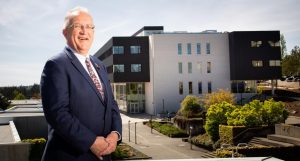
Former VIU president, Dr. Ralph Nilson, posing with the Dr. Ralph Nilson Centre for Health and Science in the background. viu.ca
NANAIMO – Vancouver Island University (VIU) is pleased to share that former president and vice-chancellor Dr. Ralph Nilson has been appointed a member of the Order of Canada.
In a media release issued Wednesday, December 29, 2021, by Her Excellency the Right Honourable Mary Simon, Governor General of Canada, she announced that Nilson received his appointment, “For his exemplary leadership as a university administrator, and for his student advocacy and commitment to the process of reconciliation.”
Created in 1967, the Order of Canada recognizes outstanding achievements, dedication to the community and service to the nation. More than 7,000 people from all sectors of society have been invested into the Order.
“Canada is defined by the people that make up this great country,” said Simon, in the media release. “These most recent nominees to the Order of Canada are shining examples of the commitment and outstanding contributions Canadians have made to the well-being of communities throughout this land, whether it be social, environmental, scientific, economic, cultural or related to mental and physical health. To all of the nominees, congratulations and thank you.”
Nilson served as VIU president for more than 12 years and is the institution’s very first President Emeritus, an honour bestowed upon him during his final convocation ceremony as president in June 2019. During that time, he spearheaded initiatives to improve access to education for all. For example, in 2013 VIU became the first institution in BC to allow former youth in care to study tuition-free. Under his leadership, VIU also became recognized nationally for its commitments to the process of truth and reconciliation. VIU’s annual Indigenous Speakers Series is one of those legacies.
“I am honored by this recognition and recognize that these individual honours come about as a result of many people pulling together focused on a common purpose,” says Nilson. “I have been blessed to work with and learn from committed colleagues and friends engaged in overcoming systemic barriers students face in accessing and excelling in post-secondary education, through which we can strive to address the multi dimensions of poverty and to make poverty less hereditary.”

